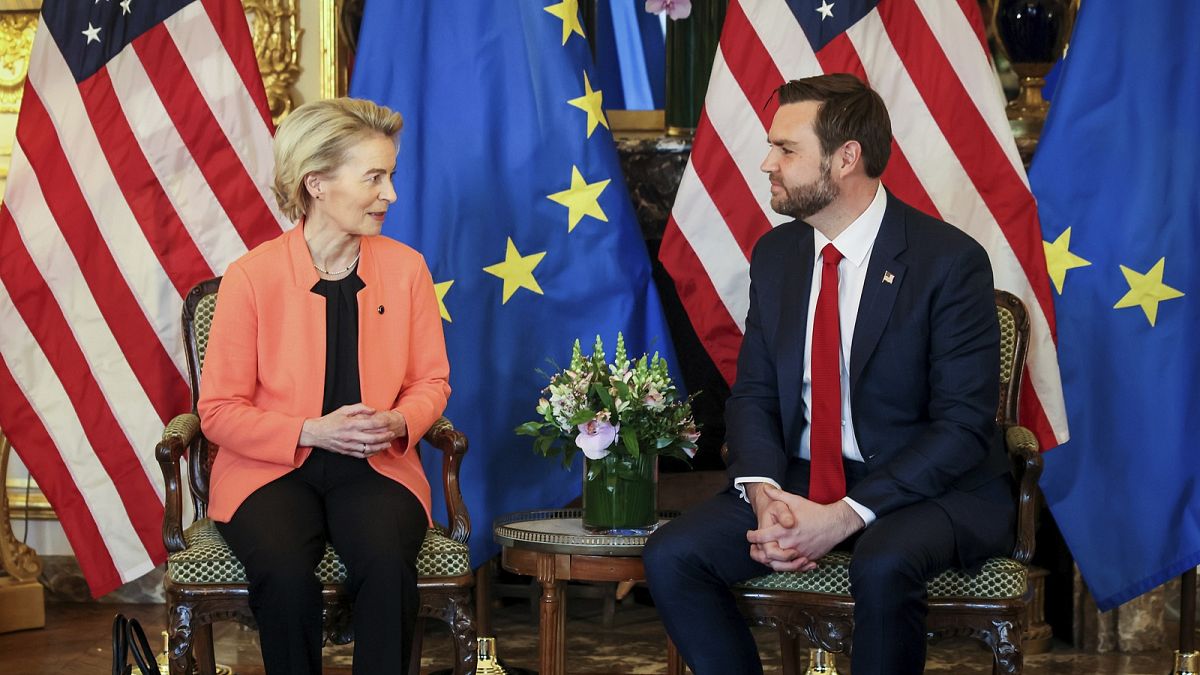Europe
‘We care about Europe,’ Vance tells von der Leyen as trade war looms

A Brewing Storm: The EU-US Trade Tensions
The relationship between the European Union and the United States has long been a cornerstone of global stability and economic cooperation. However, recent developments have sent shockwaves through this historic alliance, signaling a potential escalation into a full-blown trade war. At the heart of this conflict are tariffs imposed by the U.S. on European steel and aluminum imports, a move that has drawn sharp criticism from Brussels. Just hours after the White House announced these measures, Ursula von der Leyen, the President of the European Commission, made it clear that the EU would not stand idly by. "Unjustified tariffs on the EU will not go unanswered," she declared, vowing to take "firm and proportionate countermeasures." While the specifics of the EU’s retaliation are still unclear, the situation underscores a growing rift between two of the world’s largest economic powers.
A Meeting of Minds: Von der Leyen and Vance in Paris
Amid the rising tensions, Ursula von der Leyen and U.S. Vice President JD Vance met in Paris for their first face-to-face encounter. The meeting, which followed an AI summit hosted by French President Emmanuel Macron, was an opportunity for both leaders to address the growing friction. Vance, known for his conservative stance, sought to reassure von der Leyen of the Trump administration’s commitment to Europe. "The Trump administration cares a lot about Europe," he said, emphasizing the importance of economic and security ties. His remarks were part of a broader effort to mollify European concerns, even as the U.S. continues to adopt policies that have rattled the transatlantic partnership.
Bridging the Gap: Key Areas of Discussion
Despite the looming trade war, von der Leyen and Vance focused on areas of potential collaboration during their meeting. Among the key topics were trade relations, particularly in the energy sector, the rapid development of artificial intelligence, and the ongoing conflict in Ukraine. Von der Leyen highlighted the need for continued unity in supporting Ukraine, a position that aligns with the EU’s stance but has been less clear from the U.S. side. Vance, who has been critical of military and financial aid to Ukraine, is expected to meet with Ukrainian President Volodymyr Zelenskyy at the Munich Security Conference, a meeting that could prove pivotal in shaping the U.S. position.
A Common Foe: The Challenge of China
While the EU and U.S. grapple with their differences, both sides recognize a shared adversary: China. Beijing’s unfair economic practices, including industrial subsidies, protectionist laws, and intellectual property theft, have long been a thorn in the side of Western economies. The challenge posed by China is not merely economic; it also extends to security and global influence. The EU and U.S. are increasingly aligned in their efforts to counter China’s rise, but the current trade tensions threaten to undermine this cooperation. As High Representative Kaja Kallas warned, a transatlantic trade war would only serve to benefit Russia and China, both of which have sought to exploit divisions in the West.
A Fragile Alliance: The State of EU-US Relations
The meeting between von der Leyen and Vance took place against a backdrop of deepening strain in EU-U.S. relations. The Trump administration’s unilateral approach to international relations, coupled with its skepticism of multilateral institutions, has created significant headaches for European leaders. From threats to impose tariffs on all imported goods to provocative proposals, such as the military seizure of Greenland, the U.S. has adopted a combative tone that has alienated many of its traditional allies. The situation is further complicated by Vance’s vocal opposition to military and financial assistance to Ukraine, a position that puts him at odds with the EU’s unwavering support for Kyiv.
The Road Ahead: Can the Transatlantic Alliance Endure?
Despite the challenges, von der Leyen and Vance’s meeting offered a glimmer of hope for repairing the transatlantic alliance. Both leaders acknowledged the deep historical ties and shared values that bind the EU and U.S. together. The EU, in particular, has made it clear that it will not shy away from defending its interests, but it also recognizes the importance of maintaining a united front. As the world grapples with the dual threats of climate change and geopolitical instability, the need for cooperation between the EU and U.S. has never been greater. The question now is whether both sides can find common ground and work towards a future that honors their shared commitments to democracy, prosperity, and peace.


















